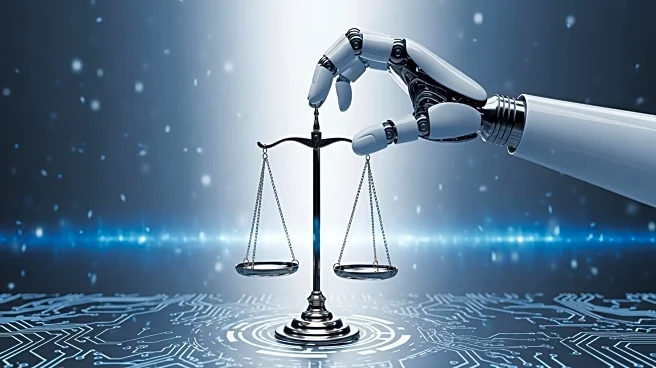What's Happening?
Law practices are experiencing significant disruptions due to the rise of artificial intelligence and shifting client expectations. Many firms are vulnerable to these changes, as automation and consolidation
impact traditional legal services. The COVID-19 pandemic further exacerbated these challenges, with brick-and-mortar firms facing closures as courts shut down temporarily. Additionally, environmental groups have begun offering free legal services, affecting niche practices that once thrived. Lawyers are encouraged to adapt by diversifying income streams and exploring new business models, such as flat fees or subscriptions, to remain competitive in the evolving market.
Why It's Important?
The disruption in law practices highlights the broader impact of technological advancements on traditional industries. As AI becomes more prevalent, legal professionals must adapt to maintain relevance and profitability. This shift could lead to a transformation in how legal services are delivered, with potential benefits for clients seeking more affordable and efficient solutions. However, it also poses challenges for lawyers who must navigate the changing landscape and find new ways to leverage their expertise. The situation underscores the need for innovation and flexibility in the legal sector to address emerging demands and opportunities.
What's Next?
Lawyers facing these challenges are advised to experiment with new approaches and identify unmet demands in the market. This may involve exploring hybrid services that integrate AI for efficiency while maintaining human oversight. Additionally, legal professionals might consider shifting to different practice areas or developing expertise in emerging fields such as AI ethics or digital estate planning. The focus should be on reinvention and defining new practice areas that address current pain points or novel problems. Successful adaptation will require a willingness to experiment and embrace change.
Beyond the Headlines
The ethical implications of AI in legal services are significant, as automation could impact the quality and accessibility of legal advice. Lawyers must consider how to balance efficiency with ethical standards and client trust. Furthermore, the cultural shift towards more tech-driven solutions may alter the traditional lawyer-client relationship, necessitating new communication strategies and service models. Long-term, these changes could redefine the legal profession, emphasizing the importance of continuous learning and adaptation to technological advancements.









